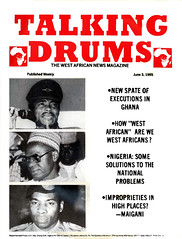Music And Arts Scene
African Records Review
By Kwabena Asamoah
ATAKORA MANU & HIS SOUND ENGINEERS BAND: 'Bre Bre Na Eve' (PMA 004). Abena Kwabena' 'Bre Bre Na Eye' Do Wo Yonko'/'Odo Ben Ni' 'Oyefo' Ko Ma Menko'
After several years of music apprenticeship with the good Old Kakaiku, Atakora Manu has also established his personal identity and miss it. musical style which bore fruit with his hit album Disko Hi-Life later to be followed by the equally rated Omintiminim.If Atakora Manu went quiet the last two years it was probably to prepare this brand new 'thing' which features, inter alia, Eric Agyemang (lead guitar), Ralph Kakari (bass), Nana Tuffour (organ) and Marceleo De Souzy (sax).
The opener Abena Kwabena' gives the keen listener a foretaste of what this cream of Kumasi musicians can do. A master of serious lyrics, Alakora Manu encourages his lead singer (Amoako Agyemang) with his rhythm guitar to offer prayers to God order that he may return home in to improve his financial situation in dignity: this is certainly the wish of Ghana's diaspora, some of whom are described as economic exiles.
Eric Agyemang's lead guitar blends effectively with Ralph Kakari's bass to tighten the music in 'Bre Bre Na Eye', probably the best track on the LP. Taking listeners into the traditional world, 'Do Wo Yonko' becomes a good sampler of a mixture of adowa and akapoma. The vocal harmony and the smooth interplay of synthesizers and organ would enliven the spirit of punters not excluding myself.
The B-side is a continuation of Atakora Manu's good lyrics - from the theme of love in 'Odo Ben Ni' to the omnipotence of God in 'Ko Ma Menko'.
On balance the A-side has got more to offer both musically and lyrically. My prediction is that 'Bre Bre Na Eye' will become one of the most popular LP's for summer 1985 especially among West Africans abroad. Don't miss it.
MANDINGO featuring FODAY MUSA SUSO: 'Watto Sitta' (CELLU- LOID 6103). 'Harima' 'Muso' 'Natural Dancer'/ 'Kansala' 'Dewgal' 'Don't Worry'.
With the increasing popularity of Mandingo kora instruments among Western music lovers, there is the urge to send scouts to West Africa to 'fish' good kora players. Celluloid, however, did not have to go beyond Chicago (USA) to recruit Foday Musa Suso who has been playing the instrument since his early days in his native Gambia.'Watto Sitta' is a typical example of fusion between the traditional and the electro-disco with the aim of pleasing Western listeners. The most difficult part of this concoction is the delicate balance which Mory Kante (Guinea/ ATION Mali) achieves. To my ears, however, Bill Laswell's production gives Musa Suso's music an overdose of electro. Not even Herbie Hancock's DX-7 riffs could save the situation. The slap of the machine drum has helped to push Suso's music more towards the synthetic.
As an instrumentalist, however, Musa Suso manages to inject style and rhythm into nearly all the tracks, especially 'Kansala', 'Harima" and 'Muso' which has a nice reggae feel.
All the tracks on this LP are sung by Musa Suso in either Mandigo or Wolof except 'Natural Dancer' which, incidentally, is the best of the lot. The use of call and answer between Suso and the female vocal line-up of Isatou Walker and Nora Harris, though average, helps to reduce the harshness of the drum machine in a music which would have thrived better on its own.
DELE ABIODUN. 'Alolo-Moko/ "Confrontation' (EARTHWORKS MWKS 3002).
From Nigeria comes Dele Abiodun who, though less known in the West than Sunny Ade and Ebenezer Obey, also carries a title - Adawa king. This brand new material will either put Abiodun on the map (and his native Nigeria with him) or help seal the coffin on this brand of music. Sunny Ade nearly succeeded in arousing some international interest in juju music, but his association with Island Records only lasted a year. Observers will therefore maintain a close interest in the Abiodun/Earthworks affair.This miniwork by Earthworks consists of two main tracks (one on each side) with one dub version of each. I have always doubted the contribution of dub versions, but there are certainly listeners who would disagree with me. In spite of the long list of musicians (typical of juju-based groups) the repetitive nature of the music is one element which could make the appreciation of this type of music difficult for the uninitiated. One needs few listenings before being spared this impression in 'Alolo-Moko with its dub version.
'Confrontation' however, is a clean sweep through a polyrhythm punctuated by an amalgam of finesse and entertainment. The talking drums talk while the guitars and the vocals take their turns at strategic intervals. With total success Abariko Itunnu's drums come across beautifully while the guitars trace 'Alome', a tune which like most others helped Ramblers (Ghana) to reach the halls of fame throughout the world. To find out what the 'confrontation is about, reach the shops for the record.
Santaclausians' charter flight
Adisadel Old Boys Association is organising a charter flight to Ghana in an effort to get as many members of the association as possible to attend the 75th Anniversary of the establishment of Adisadel College.Towards this end, the association's chartered flight leaves London's Heathrow Airport on Monday, July 1, 1985. The return fare to Accra is £350 and participants have a choice to stay for either 14 or 28 days.
All interested members should contact: The Organiser, 3 Trower House, Wick Road, London E9. Tele- phone: 01-985 5748 after 3.00pm.
There are a few vacancies for interested non-members. Closing date for application is June 9, 1985.
